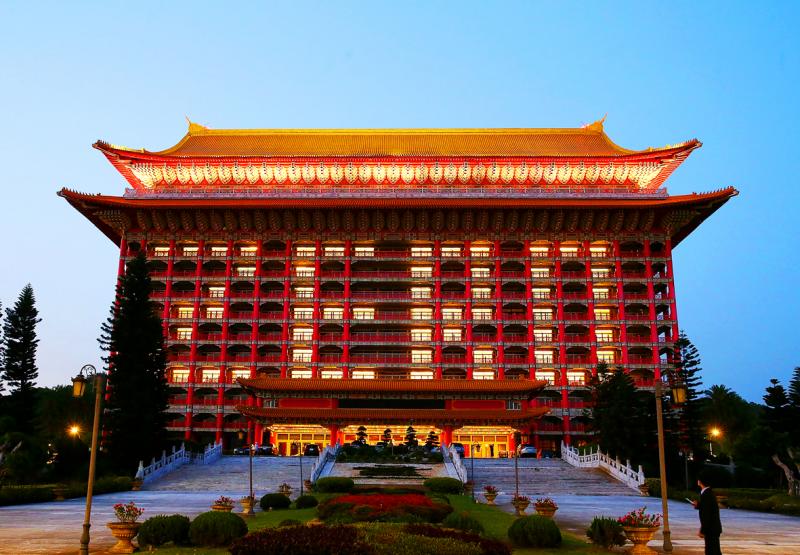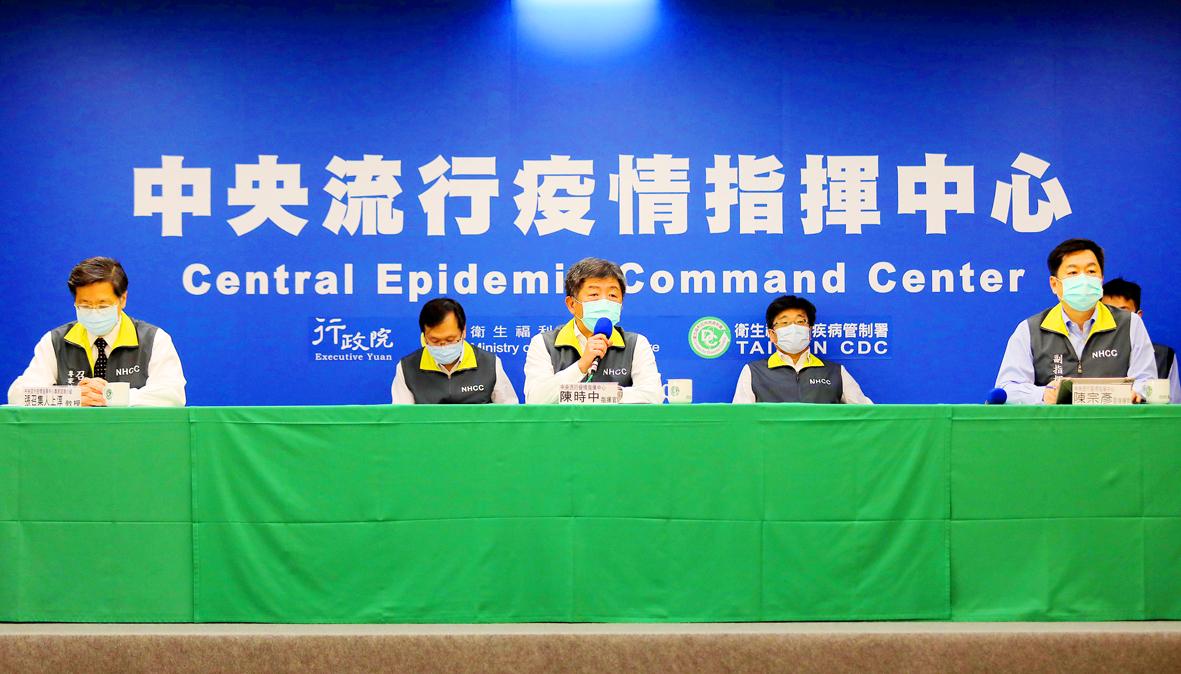The Central Epidemic Command Center yesterday reported no new cases of COVID-19 — the second time this week — and confirmed that Taiwanese and WHO experts had exchanged information about the pandemic via telephone a day earlier.
The center last reported zero new cases on Tuesday — the first time since March 9 that no new cases had been reported.
As of the center’s daily news briefing in Taipei yesterday, 155 confirmed patients had been released from isolation, up from 137 on Wednesday, the center said.

Photo: CNA
That was out of a total of 395 confirmed COVID-19 cases in Taiwan — 340 imported and 55 domestic — out of which six have died, said Minister of Health and Welfare Chen Shih-chung (陳時中), who heads the center.
The sources of 10 local infections remain unknown, he said.
Eight have completed a 14-day observation period, while two — the nation’s 336th and 379th cases — remain under investigation, Chen said, but added that the observation period for the 336th case, which was reported on April 2, was to end yesterday.

Photo: CNA
There have been no new domestic infections reported for four consecutive days, he said.
The center last reported a local infection on Sunday — one of three new cases that day.
The center on Tuesday created a legal affairs division, headed by Deputy Minister of Justice Chen Ming-tang (陳明堂), to provide faster and more meticulous legal assistance, Chen said.

Photo: CNA
Advisory specialist panel convener Chang Shan-chwen (張上淳) confirmed that a telephone conversation had taken place on Wednesday between the center and WHO officials.
At a media briefing on Wednesday, WHO principal legal officer Steve Solomon said that he and WHO COVID-19 technical lead Maria van Kerkhove had spoken with Taiwanese health authorities in February and earlier that day.
In the conference call, which lasted about an hour, WHO officials briefed the center on the global COVID-19 situation, while the center shared the measures that it has taken and the situation in Taiwan, Chang said.
The WHO officials were curious about the situation in Taiwan and wanted to know how the nation is managing to contain the coronavirus so well, he said.
Taiwanese experts expressed the hope that the nation could participate in more WHO events and told the officials that Taiwan is “very willing” to share with other nations its experience containing COVID-19, he added.
Meanwhile, asked about the results of a TVBS poll showing that he would defeat Chinese Nationalist Party (KMT) Legislator Chiang Wan-an (蔣萬安) in a Taipei mayoral election, Chen Shih-chung said that he has no plans to run for public office.
The poll, conducted via telephone from Monday to Wednesday, found that Chen would receive 53 percent of support and Chiang would receive 36 percent in a hypothetical head-to-head election tomorrow.

Right-wing political scientist Laura Fernandez on Sunday won Costa Rica’s presidential election by a landslide, after promising to crack down on rising violence linked to the cocaine trade. Fernandez’s nearest rival, economist Alvaro Ramos, conceded defeat as results showed the ruling party far exceeding the threshold of 40 percent needed to avoid a runoff. With 94 percent of polling stations counted, the political heir of outgoing Costa Rican President Rodrigo Chaves had captured 48.3 percent of the vote compared with Ramos’ 33.4 percent, the Supreme Electoral Tribunal said. As soon as the first results were announced, members of Fernandez’s Sovereign People’s Party

MORE RESPONSIBILITY: Draftees would be expected to fight alongside professional soldiers, likely requiring the transformation of some training brigades into combat units The armed forces are to start incorporating new conscripts into combined arms brigades this year to enhance combat readiness, the Executive Yuan’s latest policy report said. The new policy would affect Taiwanese men entering the military for their compulsory service, which was extended to one year under reforms by then-president Tsai Ing-wen (蔡英文) in 2022. The conscripts would be trained to operate machine guns, uncrewed aerial vehicles, anti-tank guided missile launchers and Stinger air defense systems, the report said, adding that the basic training would be lengthened to eight weeks. After basic training, conscripts would be sorted into infantry battalions that would take

GROWING AMBITIONS: The scale and tempo of the operations show that the Strait has become the core theater for China to expand its security interests, the report said Chinese military aircraft incursions around Taiwan have surged nearly 15-fold over the past five years, according to a report released yesterday by the Democratic Progressive Party’s (DPP) Department of China Affairs. Sorties in the Taiwan Strait were previously irregular, totaling 380 in 2020, but have since evolved into routine operations, the report showed. “This demonstrates that the Taiwan Strait has become both the starting point and testing ground for Beijing’s expansionist ambitions,” it said. Driven by military expansionism, China is systematically pursuing actions aimed at altering the regional “status quo,” the department said, adding that Taiwan represents the most critical link in China’s

EMERGING FIELDS: The Chinese president said that the two countries would explore cooperation in green technology, the digital economy and artificial intelligence Chinese President Xi Jinping (習近平) yesterday called for an “equal and orderly multipolar world” in the face of “unilateral bullying,” in an apparent jab at the US. Xi was speaking during talks in Beijing with Uruguayan President Yamandu Orsi, the first South American leader to visit China since US special forces captured then-Venezuelan president Nicolas Maduro last month — an operation that Beijing condemned as a violation of sovereignty. Orsi follows a slew of leaders to have visited China seeking to boost ties with the world’s second-largest economy to hedge against US President Donald Trump’s increasingly unpredictable administration. “The international situation is fraught